National parks were established to enable everybody to have access to some of the most impressive landscapes in the UK. They provide thousands of kilometres of right-of-way routes, including more than 800 miles suitable for those with mobility issues. Added to that, these are areas where wildlife thrives and is protected, traditional lifestyles are upheld, and people can enjoy the many benefits of engaging in nature.
If you love jumping in your campervan to take in the beauty of the natural world, these National Parks could be the destinations for you. Each one has its own distinct characteristics, which showcase the very best of the regions in which they are based.
With that in mind, we’re taking a look at the gorgeous parks within our shores, and revealing a great open-all-year campsite to help you make the most of your visit, whenever you tour – for more beautiful sights, take a look at our pick of the best natural wonders in Britain, either.
Don’t forget to make sure you know where you can park a campervan for when you’re exploring too.
The UK’s National Parks
Lake District
- Cumbria, England
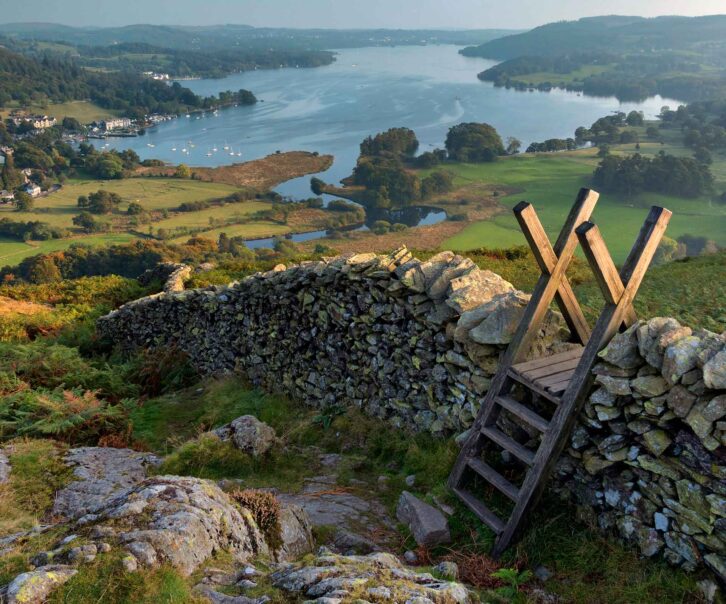
As well as being England’s largest National Park, the Lake District is a UNESCO World Heritage Site, attracting more than 18 million visitors a year. It’s unsurprising, therefore, to hear it makes a great spot for visiting in a ‘van – and if you’re thinking of heading there, don’t miss our guide to the best campervan sites in the Lake District.
There are no fewer than 16 lakes in the Lake District, with the biggest and best-known being Windermere. Interestingly, there is only one body of water that is actually a lake by name, and that is Bassenthwaite Lake. The others are ‘waters’, ‘meres’ (wide but shallow lakes) and ‘tarns’ (small glacial lakes).
The region is enormously popular for both its peaks and its waters. Walkers will love climbing the trails to the top of the fells, where amazing views await. There are routes to suit all abilities and ages, and if you do your research, you can get off the beaten track and find quiet areas away from the bustling tourist towns, such as Keswick.
Scafell Pike stands in the heart of the Lake District at 978m (3209ft) high, attracting climbers from all over the world.
Watersport enthusiasts can try their hand at everything from boating and sailing to paddleboarding, kayaking and canoeing. Wild swimmers are advised to avoid the busier lakes, especially those that allow motorboats.
- Best for… Watersports, hiking, wild swimming
- Stay at… Coniston Park Coppice CAMC Site
New Forest
- Hampshire and Wiltshire, England
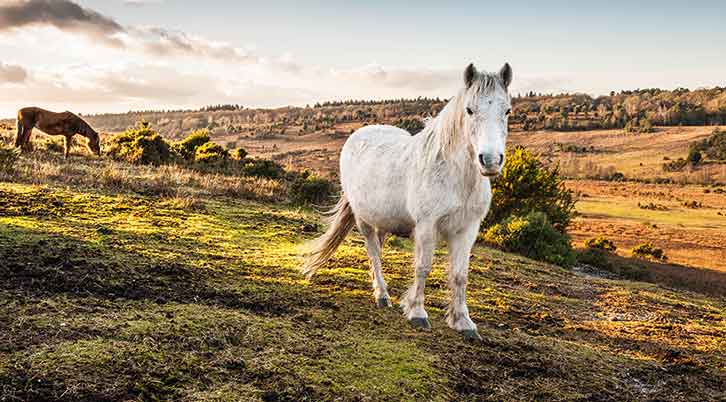
The New Forest is home to a rich variety of wildlife, mainly owing to its unique natural environment, and includes the largest area of lowland heath in England. In fact, in 2022, it was named Europe’s best National Park.
For keen birdwatchers, there are important species of heathland and wading birds to see. During nesting seasons, there are restrictions to be aware of for walkers, especially those with dogs, to help protect the birdlife.
The region is the perfect habitat for beetles, reptiles, deer and bats, among the best in Europe. And it is home to the New Forest ponies, which you will spot everywhere, often wandering over the roads as well as on open land. In fact, it’s an area that makes a scenic destination for an autumn tour.
There are plenty of well-marked walking and cycling routes on traffic-free trails, too.
- Best for… Birdwatching, walking, cycling
- Stay at… Setthorns Campsite (there are no toilets or showers though, so if your ‘van doesn’t have one, you may need the best portable toilet for a campervan)
Exmoor
- Somerset and Devon, England
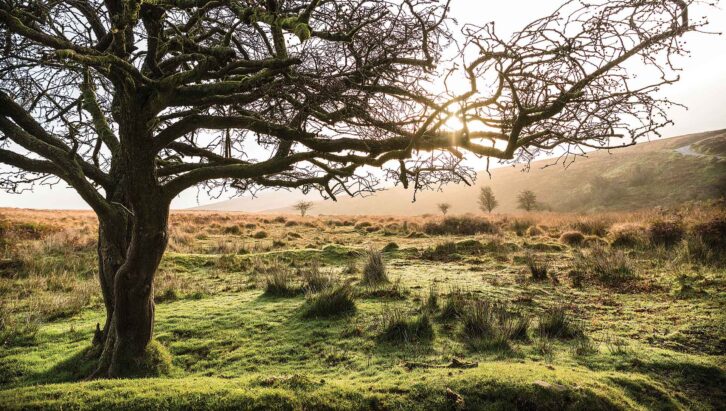
Exmoor gives you the opportunity to explore coast and countryside. It has 37 miles of glorious coastline, along which the first section of the South West Coast Path, the UK’s longest National Trail, winds from Minehead to Combe Martin.
In fact, across the whole of Exmoor there are around 620 miles of rights of way, making this a perfect destination for walkers.
This might be one of the smallest National Parks, but it has the highest coastline on the British mainland. Owing to an abundance of clean waters, Exmoor offers sea and freshwater fishing, with permits available, as well as escorted boat trips from coastal towns. Just be wary of the tides if you’re exploring the coves and beaches here.
In addition, this is a renowned International Dark Sky Reserve, with the Exmoor Dark Skies Festival happening every autumn.
- Best for… Walking, stargazing, fishing
- Stay at… Home Farm Holiday Centre
Loch Lomond & The Trossachs
West Dunbartonshire, Argyll and Bute, Perth and Kinross, and Stirling, Scotland
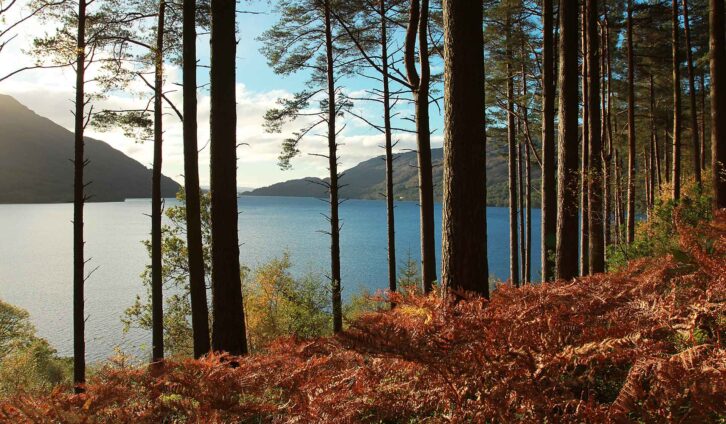
Loch Lomond & The Trossachs National Park is easily accessible from Glasgow and Edinburgh, making it a great way to connect with nature, even when you are staying in an urban environment.
Scotland’s first National Park – designated in 2002 – is made up of low-lying land around the lochs and rugged mountains in the north.
If you fancy a spot of ‘Munro bagging’ – clocking up Scottish mountains over 914.4m (3000ft) – there are 21 splendid peaks to choose from.
In the lowlands, you can walk around the stunning lochs, or take a boat trip for a different view of the landscape. There is a huge variety of wildlife to look out for, including red squirrels (three-quarters of the UK’s red squirrel population is thought to be in Scotland), golden eagles, osprey and otters.
- Best for… Wildlife, boating, hiking
- Stay at… Loch Lomond Holiday Park
North York Moors
North Yorkshire, England
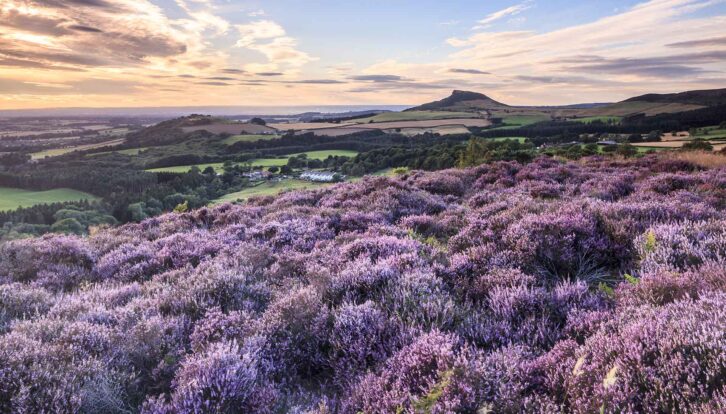
The landscape in Yorkshire has long been a source of inspiration for writers and artists. Emily Brontë described the moorland as wild and untamed, yet beautiful, in her famous novel Wuthering Heights, an apt description of what you can discover here.
North York Moors National Park is part coastal, part moorland, with scattered villages and woods lying in between.
The Cleveland Way National Trail passes through, providing 109 miles of scenic walks, which are especially beautiful in late summer when the heather blooms.
On the coast, you can take a dip in the sea or paddleboard near the shore, while across the moors, you can cycle the tracks, lanes and bridleways. There are numerous villages, too, many of which have featured in books and films: Goathland is home to the location for Hogsmeade Station in the first Harry Potter film.
To explore a different part of Yorkshire, you could also consider trying Route YC, which lets you explore the east coast of this beautiful part of the world.
- Best for… Walking, heritage sites, cycling
- Stay at… Westgate Carr Farm Holidays
South Downs
East and West Sussex, and Hampshire, England
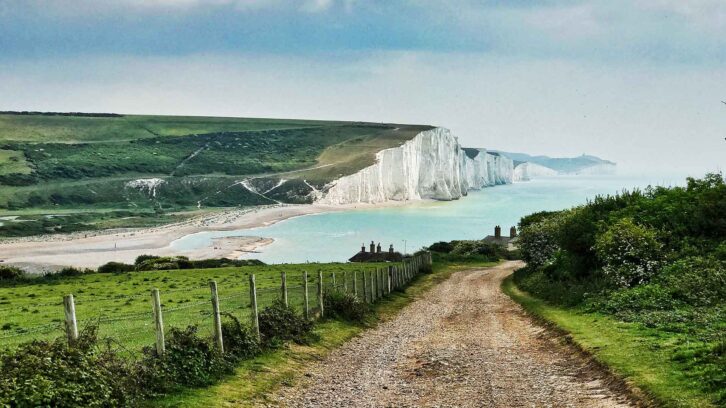
This National Park is easy to tie in with a trip to London, as it’s not far from the city and accessible via public transport. It’s a walker’s paradise, particularly on the South Downs Way, which runs for 100 miles from Winchester to Eastbourne.
The most iconic trail is on the coast path, across the Seven Sisters chalk cliffs, which create a unique part of the landscape. It’s also an important area for wildlife and wildflowers, with more than 1000 nature conservation areas within the park. The River Cuckmere is a popular spot for paddleboarding and kayaking enthusiasts.
- Best for… Walking, watersports, wildlife
- Stay at… Sumners Ponds Fishery & Campsite
Bannau Brycheiniog (Brecon Beacons)
Carmarthenshire, Monmouthshire and Powys (among others), Wales
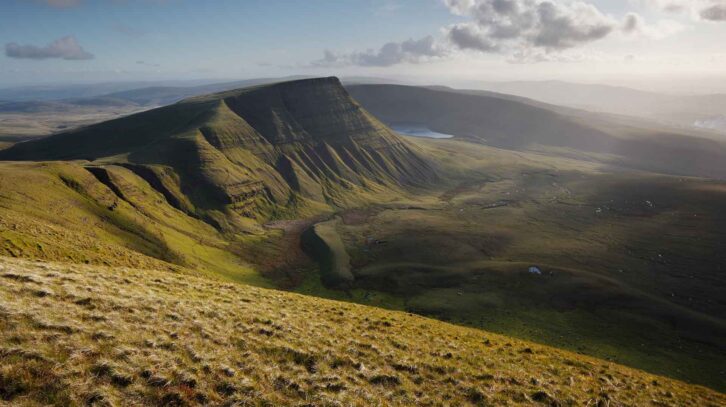
Straddling multiple counties in South Wales, Bannau Brycheiniog National Park is just north of Swansea and Cardiff. Famed for its mountains and moorland, it’s no wonder this area is so popular with walkers.
At its heart is Pen y Fan, the highest peak in South Wales at 886m (2907ft), which is visited by more than 500,000 people every year.
It lies on the Beacons Way, a long-distance footpath that runs for 99 miles through the National Park, winding its way around and over peaks in the Black Mountains, making a challenging endeavour.
There are plenty of routes for a gentle stroll, too, where you can take in the amazing landscape at your leisure. The variety of terrains – including trails, tracks, lanes and towpaths – offer great cycling. As an International Dark Sky Reserve, it’s a brilliant place for stargazing, too – on a clear night, you can see the Milky Way.
- Best for… Walking, stargazing, cycling
- Stay at… Aberbran Fach Caravan & Campsite
Pembrokeshire Coast
Pembrokeshire, Wales
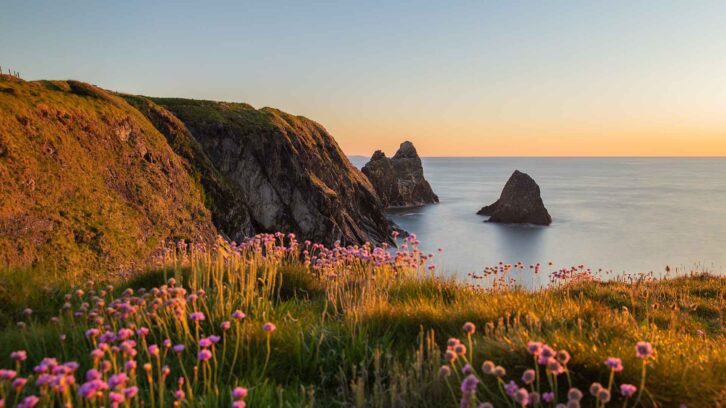
One of the smallest National Parks (after The Broads and the New Forest), this Welsh wonder in Pembrokeshire is characterised by its dramatic, sweeping coastline. Of all the parks, it’s the best for beach lovers, with plenty of Blue Flag destinations to choose from in Pembrokeshire National Park.
There are beaches that are easily accessible, and hence busier in the summer months, as well as hidden coves offering a chance to relax. You can while away time here swimming, paddling, rockpooling and indulging in watersports.
Despite its small size, there are more than 600 miles of footpaths and bridleways to explore. Keep your eyes open and you can spot rare birds, seals, and even whales and dolphins.
- Best for… Beaches, watersports, walking
- Stay at… Llanungar Caravan and Camping
The Broads
Norfolk and Suffolk, England
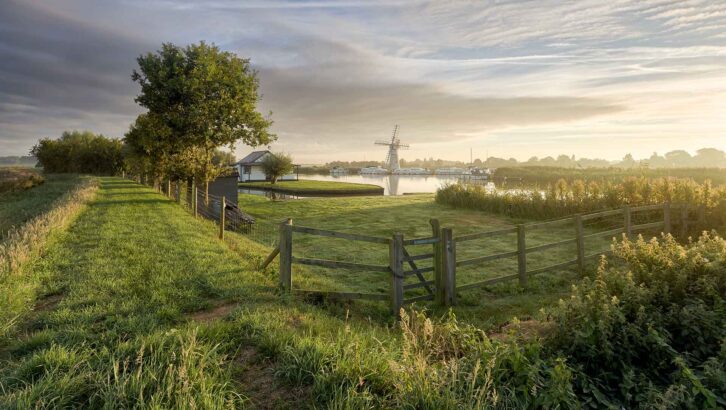
This eastern England gem is well-known for its waterways, which were formed in the 14th century when areas dug out during medieval times to get peat for fuel were flooded.
Since the 19th century, this has been a prime destination for boating. There are numerous tours available, giving you the opportunity to sit back, relax and take in the landscape.
For those more comfortable with navigating the water, you can hire a boat and set your own itinerary, or engage in some sailing. Canoeing, kayaking and paddleboarding are also popular, enabling you to traverse the waterways at your leisure.
However you take to the water, keep your eyes open for the wildlife. The area is particularly good for birdwatching, hosting many rare and migrant species. You might also spot otters, deer, adders or even a water vole. Angling is another popular pastime.
- Best for… Boating, birdwatching, fishing
- Stay at… Highgate Farm Caravan Park
Yorkshire Dales
North Yorkshire, Cumbria and Lancashire, England
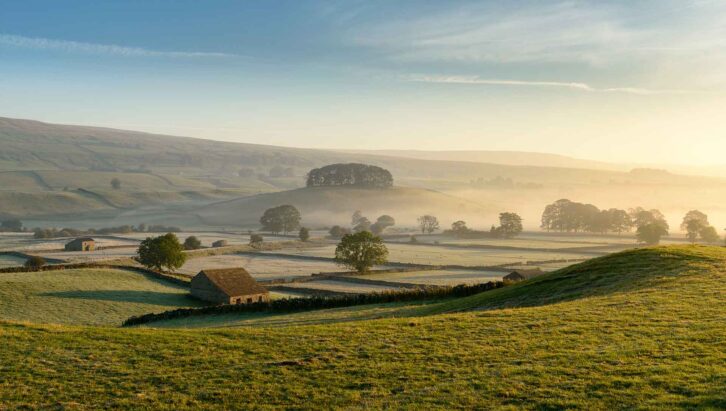
The Yorkshire Dales (dales meaning valleys) are known for their fields, drystone walls and farmland. The park is popular with hikers undertaking challenges such as the Yorkshire Three Peaks, which takes in Pen-y-Ghent, Whernside and Ingleborough, part of the Pennine range, covering 24 miles.
It’s also famed for its waterfalls, gorges and caves, which offer fantastic walks and photo opportunities. Be sure to visit Aysgarth Falls or the Ingleton Waterfalls Trail. There are numerous historic abbeys and castles, too.
- Best for… Waterfalls, hiking, caves
- Stay at… Hawes Club Campsite
Northumberland
Northumberland, England
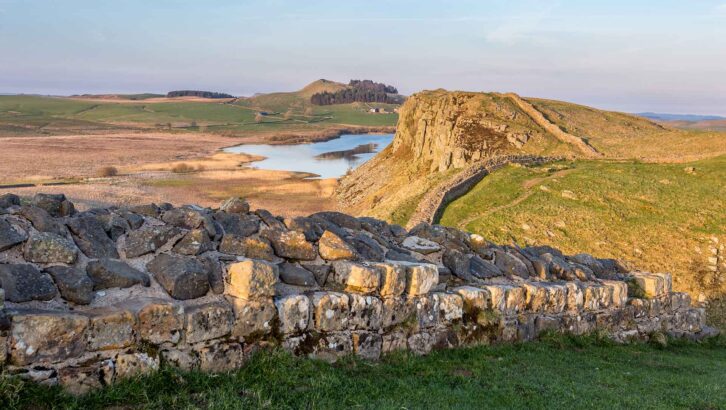
If you want to escape for a while and get lost in nature, then Northumberland National Park is the place to do it. This is the least populated of all the National Parks, nestled on the Scottish border, offering dramatic landscapes inland and on the coast.
It is also packed with history and heritage, at the heart of which is The Sill: National Landscape Discovery Centre, helping visitors learn about the local landscape, geography and habitats.
Hadrian’s Wall Path passes through here, and you can visit the remains of the third-century Brocolitia Roman Temple.
The park is also home to Sycamore Gap, where one of the most photographed trees in the country stood in a dip in Hadrian’s Wall – until it was felled in 2023. Among its many claims to fame, the venerable tree featured in Robin Hood: Prince of Thieves.
- Best for… Historic sites, walking, photography
- Stay at… Forget Me Not Country Park
Cairngorms
Aberdeenshire, Highland and Moray (among others), Scotland
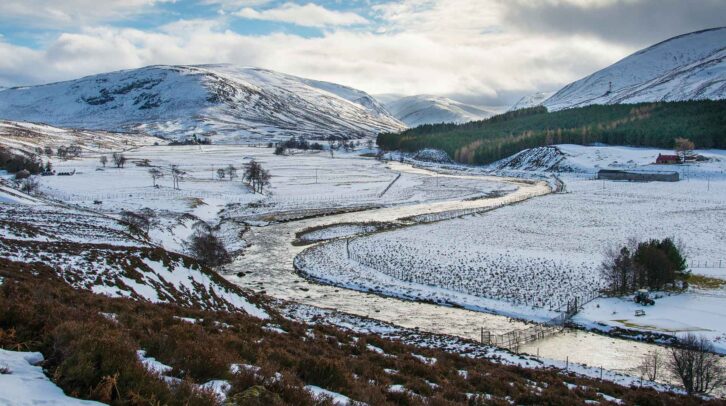
For those seeking outdoor adventure, the Cairngorms will definitely not disappoint. In the winter months, the mountain peaks get plenty of snow and the ski resorts open up. When the snow melts, the trails are perfect for hiking, biking and climbing.
For an action-packed visit, there is also white-water river tubing, canoeing, horse riding, quad biking and the first permanent bridge-based bungee jump in the UK.
It’s not all thrill-seeking and excitement: as the biggest National Park, there is lots of space for calmer activities, too. The area is dotted with castles and historic sites, most famously the royal residence of Balmoral, which is open to the public at certain times of the year.
There are also 13 golf courses, and you may even catch some of the Highland Games, which run in the summer.
- Best for… Snow sports, mountain biking, heritage sites
- Stay at… Grantown-on-Spey Caravan Park
Dartmoor
Devon, England
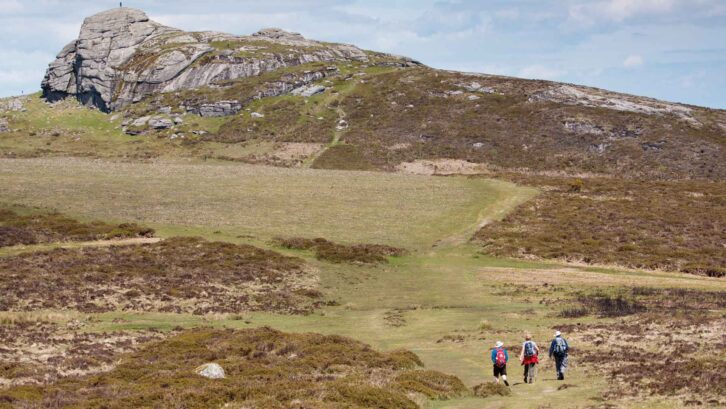
Dartmoor is home to the Ten Tors Challenge, an outdoor event for teenagers. Four hundred teams of six young people navigate 35-55 miles and the 10 nominated tors (naturally occurring granite towers) over two days, entirely self-sufficiently.
The terrain can be harsh, but the open moorland and wild landscape make it perfect for walkers of all abilities. There are plenty of places where you can park up and enjoy an amble, or you can work your way along one of the long-distance trails, including the Dartmoor Way, a 108-mile circular route.
It’s also great for cycling, with designated trails, permitted bridleways and disused railway lines to choose from.
If it’s an area you especially like, you could even consider buying a campsite there too, following Dartmoor-based Langstone Manor going on the market for £2.5m.
- Best for… Walking, cycling, wild camping
- Stay at… Tavistock Camping and Caravanning Club Site
Peak District
Derbyshire, Cheshire, and South and West Yorkshire (among others), England
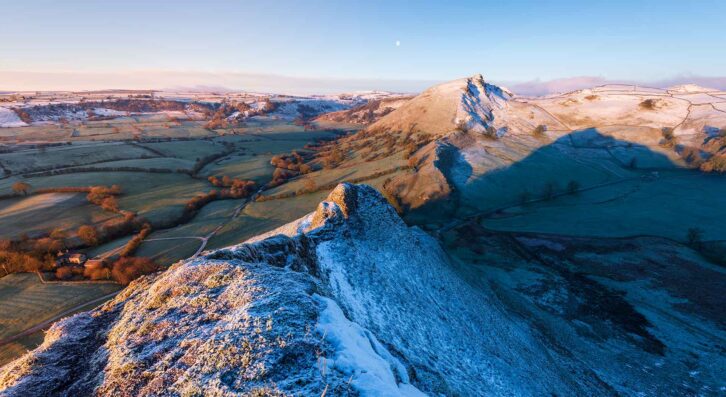
The Peak District was the UK’s first National Park and remains popular, attracting more than 13 million people every year. It’s located so centrally, it’s estimated that 20 million people live within an hour’s travel time of the park, making it a perfect way to get out and about in nature, wherever you are based in central England.
While it is just one National Park, it is often split into two areas: White Peak and Dark Peak. White Peak is the area in the south, characterised by limestone and rolling valleys. In White Peak, you can also visit Bakewell, where you must, of course, have a traditional Bakewell Tart.
In the north is Dark Peak, a far more craggy, rugged and harsh landscape. Here you will find wild moorland, roaring rivers and challenging walking conditions.
Must-visits include the reservoirs of Derwent, Howden and Ladybower for accessible walks, as well as four recreational trails that are great for family cycling.
- Best for… Birdwatching, cycling, hiking
- Stay at… Beech Croft Farm
Eryri (Snowdonia)
Gwynedd and Conwy, Wales
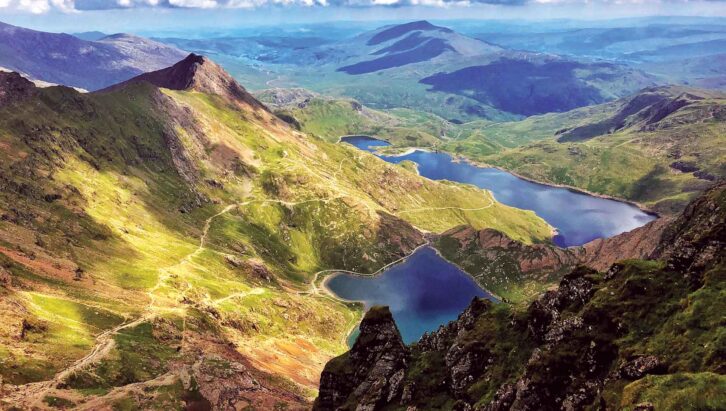
This National Park is best known for Yr Wyddfa (Snowdon), the highest mountain in Wales and the highest point in the British Isles outside Scotland.
Visitors flock from all over the world to climb it, so its car parks and trails can get busy in the warmer months. There is a mountain railway for those who want to reach the top in a more leisurely fashion. But if you want to beat the crowds, why not swerve Yr Wyddfa and explore the nine mountain ranges, including 15 peaks over 914m (3000ft), that make up Eryri National Park?
Almost two-thirds of the people who live in Eryri speak Welsh, so it’s a great place to immerse yourself in the local culture. The park is also famed as the home of plentiful wildlife, including many rare species.
- Best for… Mountain climbing, walking, wildlife
- Stay at… Beddgelert Campsite
For those who are after a different type of touring experience, don’t miss our tips on campervanning off-grid either.
After some more inspiration for where to go for a longer campervan getaway? Then head to our Go Campervanning: Longer Getaways section for more great ideas!
Lead image: Alamy Stock Photo
If you’ve enjoyed reading this article, why not get the latest news, reviews and features delivered direct to your door or inbox every month. Take advantage of our brilliant Practical Motorhome magazine SUBSCRIBERS’ OFFER and SIGN UP TO OUR NEWSLETTER for regular weekly updates on all things motorhome related.
Leave a Reply